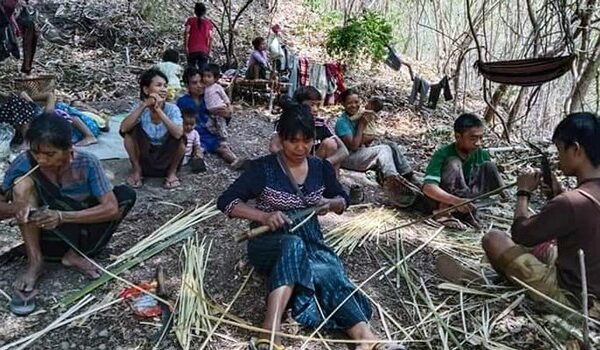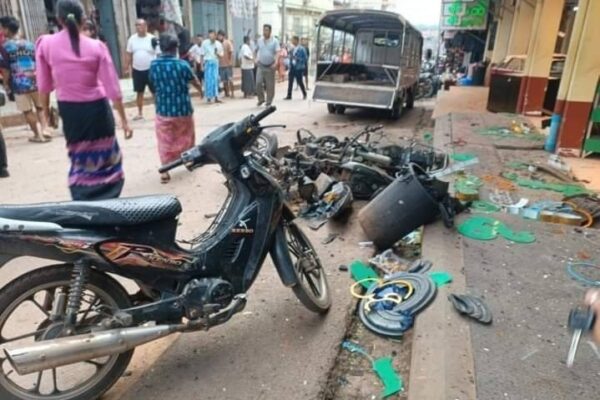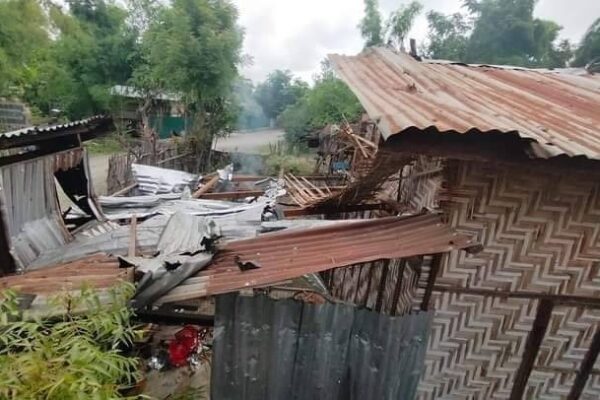About 90 Uyghur teenage girls are locked up in a Chinese-run garment factory in Xinjiang, where they are forced to toil 14 hours a day, seven days a week, and routinely face verbal and physical abuse, an investigation by Radio Free Asia has found. The Wanhe Garment Co. Ltd. in Maralbeshi county has a secret agreement with the nearby Yarkant 2nd Vocational High School under which female students aged 16 to 18 are sent to work at the factory against their will, according to four sources, including a village chief and the factory’s security chief, all of whom spoke on condition of anonymity to speak freely. Local authorities have pressured parents not to object to sending their children to work at the factory, said the village chief, a woman who was responsible for coaxing the parents to let the girls go. Workers at the plant, which also employs about a dozen women in their 30s and 40s as well as some men, are prevented from leaving. They sleep in dormitories on the factory compound. Most are Uyghurs, but about 15 are Chinese who came from elsewhere to work. The girls are kept in line by a middle-aged Uyghur woman named Tursungul Memtimin – called “teacher” by the workers – who regularly insults and criticizes them, and sometimes hits them with a bat, said the village official. “The ‘teacher’ is known to have a very bad temper. She physically assaults the workers using a bat as a means of inflicting harm,” she said. “The workers live in fear of her, and due to this intimidating environment, no one dares to make an escape,” the official told RFA. Forced labor in supply chains The revelation comes amid mounting evidence of Uyghur forced labor in Xinjiang and allegations that forced labor is used in the supply chains of major companies. Inditex, owner of the Zara clothing chain, and Uniqlo parent Fast Retailing, as well as carmakers Volkswagen, Mercedes-Benz and BMW have all come under increased scrutiny to ensure that they aren’t using Uyghur forced labor. In the United States, the Uyghur Forced Labor Prevention Act, signed into law in December 2021, requires American companies that import goods from Xinjiang to prove that they have not been manufactured with Uyghur forced labor at any stage of production. Repeated requests by RFA to Wanhe factory officials for an interview have been ignored. A Uyghur woman drives a scooter past a billboard showing China’s President Xi Jinping joining hands with a group of Uyghur elders at the Unity New Village in Hotan, northwestern China’s Xinjiang region, Sept. 20, 2018. Credit: Andy Wong/AP Despite the intense security around the factory, some workers have managed to escape – but not for long. Last April, during the Muslim fasting month of Ramadan, four girls slipped out of the compound and returned to their families in the village of Charibagh in Yarkant county, the village chief and factory security guard said. Within a few days, Memtimin and some other factory officials went to the village to forcibly bring the girls back. They threatened to send their parents to “re-education” camps if they didn’t turn over their daughters, the village official said. The village chief said she proposed to Memtimin that the girls work at a larger factory in Charibagh, but the manager refused. “So we packed their belongings and took them to the train station,” she told RFA. “Their parents were scared that Tursungul would send them for re-education, so they handed over their daughters.” Once back inside the factory, the girls underwent “criticism and education,” the security chief said. Long hours, meager pay The garment factory employs residents who mostly hail from Maralbeshi, or Bachu in Chinese, in Kashgar province, the largest cotton-producing county in Xinjiang. Ranging in age from 16 to 45, the workers toil from 7 a.m. to 11 p.m. in three shifts, with hour-long breaks for lunch and dinner, the security chief said. They are paid monthly salaries of roughly 300 yuan (US$42) or 400 yuan (US$56) at best, the guard and village chief said. “The government forcefully brought those workers to the factory to work, and they could not leave the factory of their own will,” said the guard. A Chinese husband-and-wife team oversees the factory, and gives orders to Memtimin and to the security chief, who jointly manage the workers, the village chief said. Secret agreement The village official said that about 90 students were first transferred from Yarkant 2nd Vocational High School – for students ages 15 to 18 – to the factory in February 2017 based on a private contract. She said she saw a contract that was signed by Wanhe officials and the school’s two principals, surnamed Qurbanjan and Abdurusul. Neither the workers nor their families were aware of the agreement’s content, she said. “Tursungul Memtimin speaks Chinese, so the Vocational High School invited her to work for them. She does not teach at the school, but she manages the workers at the factory,” the village official said. “Her monthly salary is 6,500 yuan (US$910). The school gives her 3,000 yuan, and the factory gives her 3,500 yuan,” she said. “I saw the signatures of Qurbanjan and Abdurusul on the contract,” she said. “They are the presidents of the 2nd Vocational High School.” Attempts to reach school administrators were unsuccessful. But two officials at the Yarkant County Education Bureau described the contract’s content as “a state secret,” and that they were aware of the workers’ situation. “I know the contract between the Vocational High School and Wanhe clothes factory,” said the education bureau chief, insisting he not be named for security purposes. “But it is considered a state secret, so we cannot say anything about it hastily.” The factory security guard also confirmed the existence of a secret contract. “The workers complained about Tursungul because she has a terrible mouth and curses them,” he said. “We cannot say Tursungul has a right to condemn and beat the workers, but she…







